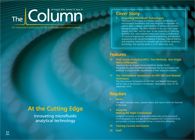The International Symposium on GPC/SEC and Related Techniques
The International Symposium on GPC/SEC and Related Techniques will be held at the Novotel in Amsterdam, Netherlands, from 27–29 September 2016.
Photo Credit: Andrey Danilovich/Getty Images

The International Symposium on GPC/SEC and Related Techniques will be held at the Novotel in Amsterdam, Netherlands, from 27–29 September 2016.
The International Symposium on GPC/SEC and Related Techniques returns to Europe following a highly successful conference in Philadelphia, USA, in October 2015. This unique event focuses on bringing together the three key elements of instrumentation: innovation, industrial research, and academia. Through a series of scientific presentations and open forum discussions, led by some of the most renowned experts in this field, attendees are immediately immersed into open debate regarding the most important and current analytical challenges facing the polymer characterization industry.
The Symposium has its roots in the early stages of GPC/SEC adoption, the first Symposia being organized by Waters Associates in the early 1960s. Today, the ever increasing complexity of high performance materials, coupled with the introduction of a vast array of modern analytical tools, encouraged Waters Corporation and Polymer Standards Services GmbH to bring this Symposium back to the annual conference calendar.
Day one of the Symposium will consist of an expert day designed to introduce the delegates to the conference’s panel of experts, whose primary role is to facilitate the workshop sessions on the following two days. Each expert will be allotted a 45-min presentation slot to discuss their most active area of research. The industry experts who will be bringing their broad spectrum of knowledge and wisdom this year are:
- Jana Falkenhagen (BAM, Berlin Germany) - Multi-Dimensional Techniques with a Focus on LC–MALDI/ESI-TOF-MS
- Elena Uliyanchenko (Sabic, Netherlands) - Comprehensive 2D LC/UHPSEC
- Harry Philipson (DSM Resolve, Netherlands) - State of the Art of Size- and Interaction-Based Separations for Industrial Polymers
- Taihyun Chang (Pohang Uni of Science and Technology, South Korea) - HPLC Characterization of Polymers
- Miroslav Janco (Dow-Dupont, USA) - GPC/SEC Using Advanced Detectors
Day two of the Symposium will focus on separations, commencing with a plenary lecture from Bastiaan Staal (BASF, Ludwigshafen, Germany) on The Comeback of 2D Chromatography in the Characterization of Industrial Polymers.
This will be followed by workshop sessions on:
- GPC/SEC Potential and Limitations
- Related Techniques (LAC/FFF/SFC etc.)
- The Vendors Perspective on Analytical Challenges
Each workshop session will comprise of four short invited talks followed by a 1 h open facilitated discussion.
Day three will follow the same format as day two and will focus on detectors, commencing with a plenary lecture from Andre Striegel (NIST, USA) entitled How Can Multidetector SEC Inform our Knowledge of Mechanical Polymer Degradation? This talk will be followed by workshop sessions on:
- GPC/SEC with MS/NMR/FTIR Detection
- GPC/SEC with Viscometry and MALLS
Scientists and researchers are invited to submit poster and oral abstracts that will be reviewed by the experts and selected on merit for inclusion within the programme.
A new addition to the programme for 2016 is an optional pre-symposium educational workshop. On Monday 26 September an introduction to the theory behind the key topics will be given so that attendees can fully profit from the expert presentations and the conference sessions on the following days.
E-mail: joy_longa@waters.com
Website: www.gpcevent.com
















Thermodynamic Insights into Organic Solvent Extraction for Chemical Analysis of Medical Devices
April 16th 2025A new study, published by a researcher from Chemical Characterization Solutions in Minnesota, explored a new approach for sample preparation for the chemical characterization of medical devices.
Sorbonne Researchers Develop Miniaturized GC Detector for VOC Analysis
April 16th 2025A team of scientists from the Paris university developed and optimized MAVERIC, a miniaturized and autonomous gas chromatography (GC) system coupled to a nano-gravimetric detector (NGD) based on a NEMS (nano-electromechanical-system) resonator.
Miniaturized GC–MS Method for BVOC Analysis of Spanish Trees
April 16th 2025University of Valladolid scientists used a miniaturized method for analyzing biogenic volatile organic compounds (BVOCs) emitted by tree species, using headspace solid-phase microextraction coupled with gas chromatography and quadrupole time-of-flight mass spectrometry (HS-SPME-GC–QTOF-MS) has been developed.
A Guide to (U)HPLC Column Selection for Protein Analysis
April 16th 2025Analytical scientists are faced with the task of finding the right column from an almost unmanageable range of products. This paper focuses on columns that enable protein analysis under native conditions through size exclusion, hydrophobic interaction, and ion exchange chromatography. It will highlight the different column characteristics—pore size, particle size, base matrices, column dimensions, ligands—and which questions will help decide which columns to use.
Thermodynamic Insights into Organic Solvent Extraction for Chemical Analysis of Medical Devices
April 16th 2025A new study, published by a researcher from Chemical Characterization Solutions in Minnesota, explored a new approach for sample preparation for the chemical characterization of medical devices.
Sorbonne Researchers Develop Miniaturized GC Detector for VOC Analysis
April 16th 2025A team of scientists from the Paris university developed and optimized MAVERIC, a miniaturized and autonomous gas chromatography (GC) system coupled to a nano-gravimetric detector (NGD) based on a NEMS (nano-electromechanical-system) resonator.
Miniaturized GC–MS Method for BVOC Analysis of Spanish Trees
April 16th 2025University of Valladolid scientists used a miniaturized method for analyzing biogenic volatile organic compounds (BVOCs) emitted by tree species, using headspace solid-phase microextraction coupled with gas chromatography and quadrupole time-of-flight mass spectrometry (HS-SPME-GC–QTOF-MS) has been developed.
A Guide to (U)HPLC Column Selection for Protein Analysis
April 16th 2025Analytical scientists are faced with the task of finding the right column from an almost unmanageable range of products. This paper focuses on columns that enable protein analysis under native conditions through size exclusion, hydrophobic interaction, and ion exchange chromatography. It will highlight the different column characteristics—pore size, particle size, base matrices, column dimensions, ligands—and which questions will help decide which columns to use.
